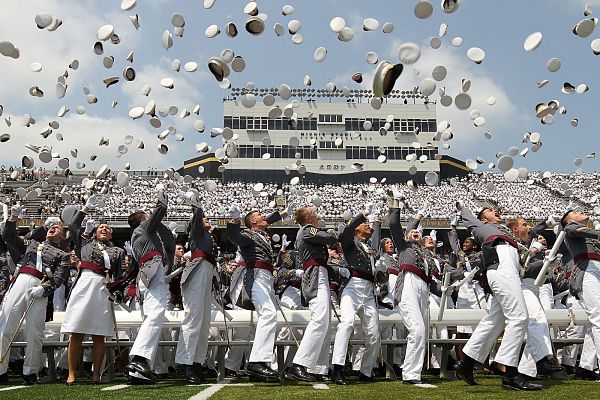As the calendar now reads May, all of us in higher education begin that ritual march that closes down the end of the academic year. There are finals to be graded. Residence halls to be emptied and prepared for the wave of summer campers to arrive. The culmination of these activities is commencement when we welcome our graduates and their families to campus.

Is there a better tradition than the Hat Toss at West Point? I have always loved the pomp and ceremony of commencement. But I once took graduation for granted. I’ve vowed to never do so again.
Judging by the small number of faculty and staff that attend graduation, it seems many in higher education take graduation for granted too.
For me, commencement was a pain. I had to get up early on a Saturday, fight the traffic to and from and the ceremony, and sit through a couple of hours where I only knew a handful of the graduates. What was the point? Why waste my time?
Or so I thought.
My mistake was that I thought it was about me. My Saturday, my time, the graduates I knew. I couldn’t have been more wrong.
As perhaps with many of us in higher education, I did well in school. I never questioned whether I would finish so graduation seemed a foregone conclusion. The logical culmination of completing a series of academic requirements.
The reality is that academic success isn’t guaranteed. We know that it is by no means guaranteed for first-generation, underprepared, or underrepresented students. Even for our students with advantage and privilege, graduating from college is a significant milestone.
One of the greatest attributes of higher education is that we honor tradition and reward success. The academic regalia donned during commencement dates back to universities hundreds of years ago. Pomp and Circumstance has been played at graduation ceremonies for over a hundred years (although not originally as a processional as this NPR story details). Colleges and universities reward success. We grade students on their academic success in the classroom and confer degrees to reward their completion of degree requirements. Although we don’t want students relying solely on these rewards, they provide important markers for students and others outside of the university.
Commencement isn’t about the regalia and it certainly isn’t about the speeches. In fact, there may be no genre of public speaking so poorly performed although Steve Jobs and Brian Williams are two personal favorites. The importance of commencement is recognizing the accomplishment and transition to a new world of responsibilities. The symbolism of walking across the stage acknowledges not only new status as a graduate but the responsibilities that come with an educated citizen of our country. The piece of paper is nice, but the value of public recognition is a gift for graduates, families, friends, faculty, and staff.
As an academic community, we should appreciate and honor the success of our students. We should recognize the motivation, abilities, and accomplishments of our graduates.
I will sit in the audience and watch with pride of all the graduates that walk across the stage. I look forward to sharing the day with students that I’ve had the distinct privilege of getting to know, teach, and mentor over the past couple of years. I promise not to take it for granted.
Take some time to attend your institution’s commencement exercises and celebrate the accomplishment of this year’s graduates. Here’s to the Class of 2014!
Question: Do you attend your institution’s commencement? Why or why not? What are your favorite aspects of graduation? You can leave a comment by clicking here.


Please note: I reserve the right to delete comments that are offensive or off-topic.